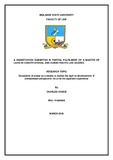Please use this identifier to cite or link to this item:
https://cris.library.msu.ac.zw//handle/11408/3924Full metadata record
| DC Field | Value | Language |
|---|---|---|
| dc.contributor.author | Vhudzi, Charles | - |
| dc.date.accessioned | 2020-12-01T10:27:17Z | - |
| dc.date.available | 2020-12-01T10:27:17Z | - |
| dc.date.issued | 2019 | - |
| dc.identifier.uri | http://hdl.handle.net/11408/3924 | - |
| dc.description.abstract | The crux of the study is the analysis of whether devolution of governmental powers can be used as a mechanism to achieve the realisation of the right to development in Zimbabwe. The study brings devolution into context analysing what devolution entails. An evaluation of the right to development and its fundamental principles such as transparency is also undertaken in order to examine the point of harmony of the two principles of devolution and the right to development. The study further examines how the right to development is provided for in international law. The harmony between devolution and the right to development is established showing how theoretically the existence of devolution in a jurisdiction could potentially lead to the realisation of the right to development. The study then examines the jurisdiction of Uganda which is a country that has implemented an ambitious form of devolution of governmental powers with five tiers of lower levels of government. Observations are made that despite implementing an extensive devolution legal framework the realisation of the right to development has been marred by bad politics and constant interference by the central government. The study observes that it is not just adequate to have laws on paper there should be execution and implementation of the same. The Zimbabwean position on devolution was also evaluated herein with an overview of what the Zimbabwean Constitution provides for both aspects. Conclusions are reached to the effect that the realisation of development can be indeed an objective of devolution of governmental powers. The study makes recommendations and conclusions based on the findings particularly on how best devolution of governmental powers to lower levels of government may be utilised as a mechanism to realise the right to development. | en_US |
| dc.language.iso | en | en_US |
| dc.publisher | Midlands State University | en_US |
| dc.subject | Devolution of power | en_US |
| dc.subject | right to development | en_US |
| dc.subject | Zimbabwean perspective | en_US |
| dc.subject | Ugandan experience | en_US |
| dc.title | Devolution of power as a means to realise the right to development: A Zimbabwean perspective vis a vis the Ugandan experience | en_US |
| dc.type | Thesis | en_US |
| item.languageiso639-1 | en | - |
| item.openairetype | Thesis | - |
| item.cerifentitytype | Publications | - |
| item.grantfulltext | open | - |
| item.openairecristype | http://purl.org/coar/resource_type/c_18cf | - |
| item.fulltext | With Fulltext | - |
| Appears in Collections: | Master of Laws: Constitutional and Human Rights Law | |
Files in This Item:
| File | Description | Size | Format | |
|---|---|---|---|---|
| Vhudzi.pdf | Full Text | 867.56 kB | Adobe PDF |  View/Open |
Page view(s)
296
checked on Jan 11, 2026
Download(s)
210
checked on Jan 11, 2026
Google ScholarTM
Check
Items in MSUIR are protected by copyright, with all rights reserved, unless otherwise indicated.



